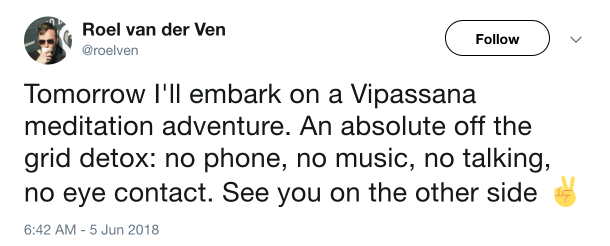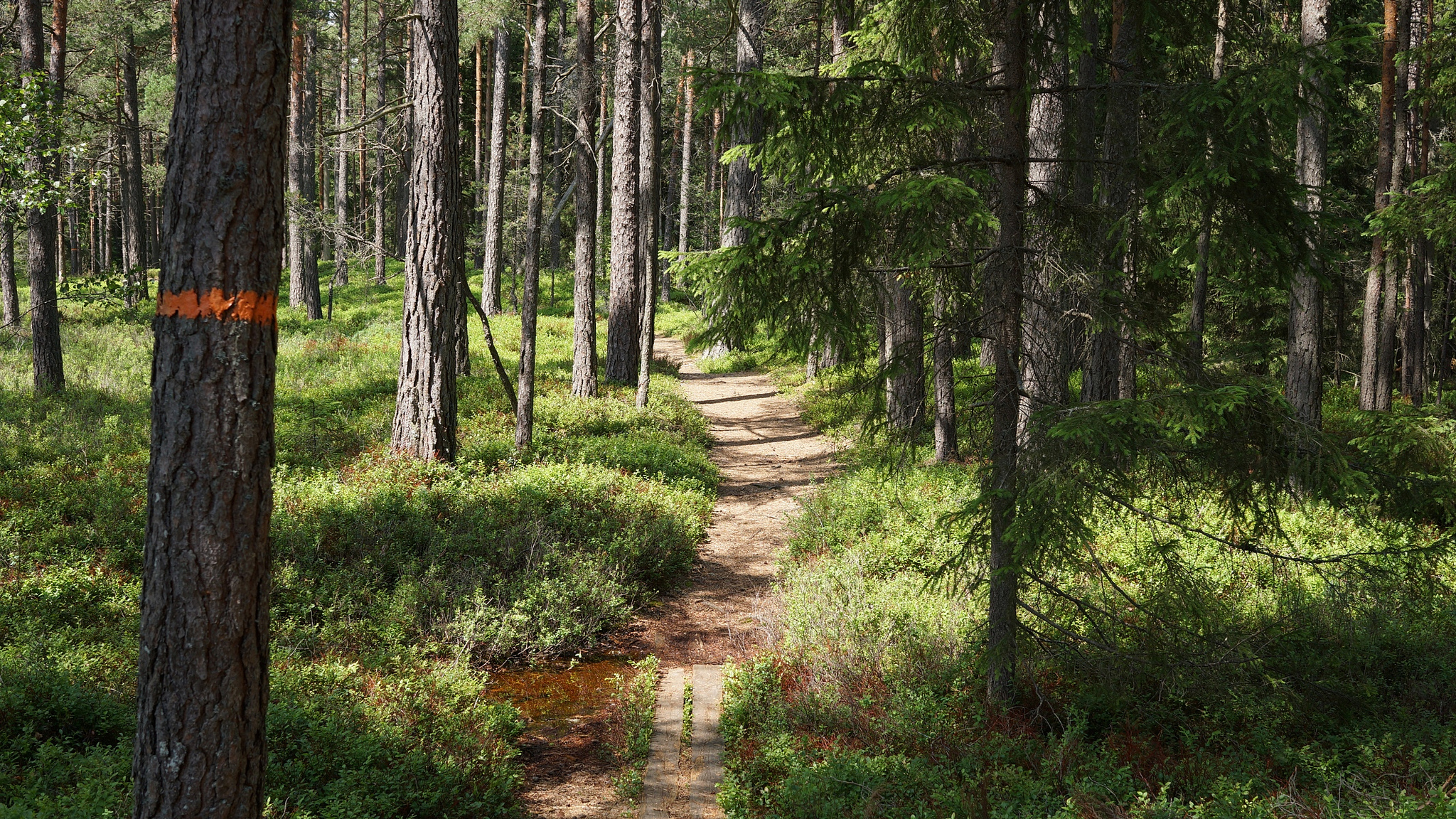In June 2018 I’ve participated in a Vipassana 10 day meditation course. After having processed most of it, I feel the need of articulating my thoughts and feelings here. The below is only a summary of my own experience. There is no guarantee you will experience similar things.
If you have been considering participating in a course, I hope my experiences can help make up your mind. I’m considering this adventure one of the best investments I could have made in terms of personal development, but Vipassana is not a simple walk in the park!

Oh, how over confident and naive I was…
Vipassana meditation
Throughout my adult life I’ve occasionally read about meditation. I was curious about the cognitive benefits, the esoteric background and the supposed calm it could bring. Previously I’ve dabbled in (vinyasa) yoga and some easy meditation practices like visualization and mindfulness through breathing, but never considered going “deep”. Friends have told me about their experiences and after some research I decided that Vipassana stood out as the best available option for an intense immersion without the distractions of daily life.
Vipassanā (Pāli) or vipaśyanā (Sanskrit: विपश्यन) in the Buddhist tradition means insight into the true nature of reality.[1] (…) this specifically refers to insight into the three marks of existence: impermanence, suffering or unsatisfactoriness, and the realisation of non-self.
Source: Wikipedia.
Vipassana is taught by way of a 10-day course at one of the centers run by Dhamma. You can participate by visiting one of these locations and disconnecting from the outside world completely. Dhamma is an international non-profit organization that runs purely on donations with multiple meditation centers across the world. I’ve been close to signing up for a course in Germany, but now being in Sweden I was lucky to find another center not too far away!
In conversations with friends and colleagues, I used the words “meditation retreat” as to describe where I was going. I feel pretty naïve afterwards! It should be noted that a Vipassana course should in no way be considered a retreat. It’s not a holiday or recovery trip, this is 10 days of hard work! I grossly underestimated this and experienced it as both mentally and physically tough.
To give you an idea of how a day at the course looks like, have a look at the daily schedule:
| 04:00 | Morning wake-up bell |
| 04:30-06:30 | Meditate in the hall or in your room |
| 06:30-08:00 | Breakfast break |
| 08:00-09:00 | Group meditation in the hall |
| 09:00-11:00 | Meditate in the hall or in your room according to the teacher’s instructions |
| 11:00-12:00 | Lunch break |
| 12:00-13:00 | Rest and interviews with the teacher |
| 13:00-14:30 | Meditate in the hall or in your room |
| 14:30-15:30 | Group meditation in the hall |
| 15:30-17:00 | Meditate in the hall or in your own room according to the teacher’s instructions |
| 17:00-18:00 | Tea break |
| 18:00-19:00 | Group meditation in the hall |
| 19:00-20:15 | Discourse in the hall |
| 20:15-21:00 | Group meditation in the hall |
| 21:00-21:30 | Question time in the hall |
| 21:30 | Retire to your own room–Lights out |
What is Vipassana?
Vipassana is a way of self-transformation through self-observation. It focuses on the deep interconnection between mind and body, which can be experienced directly by disciplined attention to the physical sensations that form the life of the body, and that continuously interconnect and condition the life of the mind. It is this observation-based, self-exploratory journey to the common root of mind and body that dissolves mental impurity, resulting in a balanced mind full of love and compassion.
To rephrase this: you will discover truth by observing the connection of your mind and body. The only way to do be sure this is the truth is to experience it yourself. By honing your observation skills you will be able to see more and therefore understand more. This is true for your own self, but also the world around you.
An important aspect of a Vipassana course is that there is no social interaction. No talking, no touching and no eye contact. By depriving yourself from social input you are able to really listen and observe, so that you can notice the smallest thing possible. Of course, whenever you really need to talk to someone you can approach the teacher and speak with them. In the evening on the first day, you take a vow of silence. All participants commit to not speaking for the entire duration of the course. This was hard at times, but also an incredibly interesting experience. We underestimate how social we truly are and at some point I really craved some small talk! I also loved it though, to work alone on something and to be able to focus without distraction felt amazing.
When I look back at what I take away from this course, I’ve realized that I can put things into perspective more easily and that every action or emotion is connected to something deeper. Nothing is permanent, everything is fleeting. In the grand scheme of things, we are here only for a blip of time. This is also true for your experiences. The phrase “This too shall pass” came to me frequently during the practice. We should not get attached to any particular feeling, as it will pass anyway at some point. Through meditation I’ve come to learn that the highs and lows of my mental state became more evened out and I felt more balanced.
At the last day the vow of silence was lifted and we were allowed to speak again. How delightful it was to speak to the people who’ve been hard at work on the same thing, side by side for ten days! We discussed experiences, events that happened and found ourselves in philosophical conversations many times throughout that day. Everyone’s experience is different and very personal. If you are considering attending a course based on experiences you’ve heard from others, please invest some time in more research. Like many other meditation techniques, Vipassana is about the process and not about the result. One of the key points of the discourse is that one shouldn’t try to reach a certain state or feeling, based on previous experiences. It will likely make you unhappy or you’ll struggle trying to achieve something that will only come naturally.
A word of warning
Please don’t consider Vipassana as a way to heal or recover from something. Some participants in my cohort were going through really difficult things and I’ve read on forums that the organisation is not equipped to support people with psychological or emotional issues. If you are interested in Vipassana but you know you are dealing with something, get professional help first.
